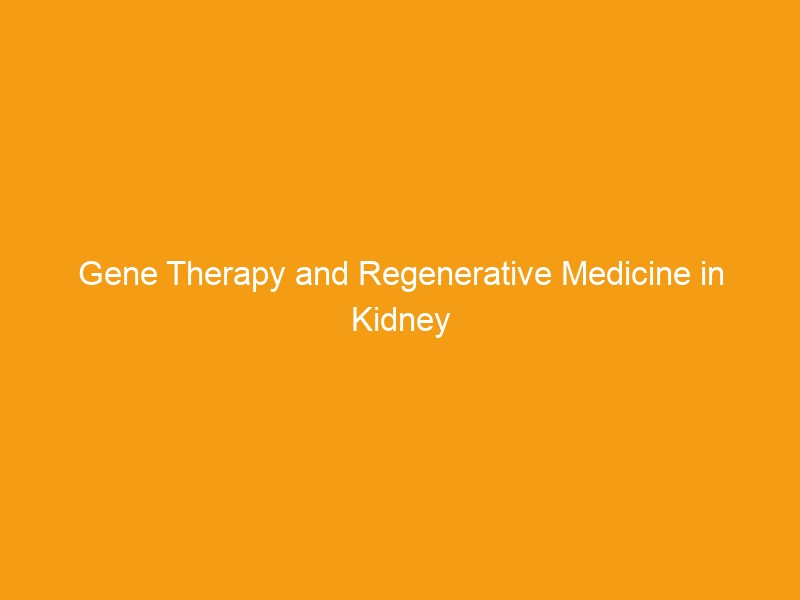Introduction to Kidney Disease and Current Challenges
More than 10% of people worldwide suffer from kidney disease, making it a widespread medical condition. Its insidious progression can result in chronic kidney disease (CKD) and end-stage renal disease (ESRD), conditions that significantly impair quality of life and increase the risk of mortality. Treatments such as dialysis or transplantation, while life-saving, come with substantial physical, emotional, and economic burdens. Traditional therapies largely focus on symptom management and slowing disease progression, leaving a critical gap in curative options. This underscores an urgent need for innovative interventions that can address the disease at its root. Certain populations, notably those with African American kidney disease, are disproportionately affected, which highlights the necessity for tailored treatments that accommodate genetic, environmental, and lifestyle factors to promote equitable healthcare outcomes.
Understanding Gene Therapy in Kidney Disease
At the vanguard of contemporary medicine is gene therapy, which aims to treat or prevent disease by modifying genetic expressions or fixing defective genes. For kidney disease, this translates to potentially halting disease progression by addressing genetic mutations directly responsible for renal impairment. Technologies such as CRISPR-Cas9 have revolutionized this field by allowing precise genetic modifications and targeting specific mutations with high accuracy. Clinical trials are pivotal in exploring these therapies’ potential, working towards safe, effective approaches with lasting benefits. By potentially reducing or even eliminating the need for dialysis or transplantation, gene therapy offers a transformative pathway towards improved outcomes for patients with genetic predispositions to kidney disease.
Regenerative Medicine: A New Frontier
The goal of regenerative medicine is to use the body’s inherent healing powers to replace or repair damaged tissues and organs. In the context of kidney disease, this involves using stem cells, bioengineered tissues, or biomaterials to regenerate damaged kidney tissues and restore their function. In renal tissues, mesenchymal stem cells have demonstrated promise in lowering inflammation and encouraging repair, and developments in tissue engineering are making the possibility of bioengineered kidney tissues a reality. The capacity of regenerative medicine to not only manage symptoms but potentially repair kidney damage offers a revolutionary approach that could profoundly affect treatment efficacy and patient quality of life, making it a crucial area of ongoing research and clinical trials.
Key Clinical Trials and Innovations
Clinical trials are essential in testing the viability and efficacy of gene therapy and regenerative medicine approaches. Recent studies include exploring the use of induced pluripotent stem cells (iPSCs) for kidney regeneration and gene editing technologies for correcting hereditary defects. These trials are instrumental in translating groundbreaking scientific discoveries into practical medical treatments. Success in these trials could significantly shift treatment paradigms, providing effective, lasting solutions for chronic kidney conditions. As trials advance, they pave the way for new therapies and refine existing methodologies to ensure safer, more efficient treatment options. In order to connect lab findings with practical medicinal applications, clinical trials are essential.
Challenges in Conducting Trials
Conducting trials in gene therapy and regenerative medicine involves numerous challenges. High costs, complex logistics, and the necessity of long-term follow-up to assess treatment efficacy and safety pose significant hurdles. Additionally, the genetic and phenotypic variability among patients requires highly individualized trial designs, complicating recruitment and data interpretation. Ensuring rigorous ethical oversight and participant safety amidst these complexities is paramount. Trials must also address logistical concerns such as the equitable recruitment of diverse participants and comprehensive informed consent processes. Overcoming these challenges is crucial to advancing these novel therapies from experimental concepts to standardized clinical practices that benefit all patients.
Current Ethical and Regulatory Considerations
The advancement of gene therapy and regenerative medicine brings new ethical and regulatory challenges that require careful consideration to safeguard participants and ensure public trust. Ethical issues, particularly related to gene editing, revolve around potential long-term effects and the ethical implications of permanent genetic alterations that future generations could inherit. Regulations are changing to guarantee the responsible development of these innovative treatments. Addressing these ethical and regulatory challenges is essential for fostering innovative solutions that are both safe and effective.
The Promise of Personalization
Personalized medicine, which adapts treatments to each patient’s specific genetic, environmental, and lifestyle factors, offers a revolutionary approach to managing kidney disease. By harnessing genomic data and utilizing biomarkers to predict treatment responses, personalized medicine can significantly enhance the effectiveness of gene therapies and regenerative treatments while minimizing adverse effects. This patient-specific approach allows for more precise interventions that align with individual health profiles, offering targeted solutions rather than one-size-fits-all treatments. As research progresses, personalized medicine promises to transform kidney disease management by improving outcomes and reducing side effects, ultimately elevating the standard of care for patients with renal diseases.
Conclusion
Integrating gene therapy and regenerative medicine into kidney disease treatment can revolutionize current medical paradigms by offering solutions beyond symptom management to address underlying disease causes. While challenges remain, particularly regarding ethical considerations and regulatory compliance, ongoing clinical trials are paving the way for innovations that could lead to long-term improvements in patient outcomes. By advancing these technologies and refining treatment methodologies, there is an opportunity to significantly enhance the quality of life for individuals with kidney disease and usher in a new era of medical treatment that prioritizes effectiveness, safety, and patient-centered care. As these therapies continue to develop and mature, they offer a hopeful vision for the future of kidney disease treatment, one where disease is managed and potentially reversed.

